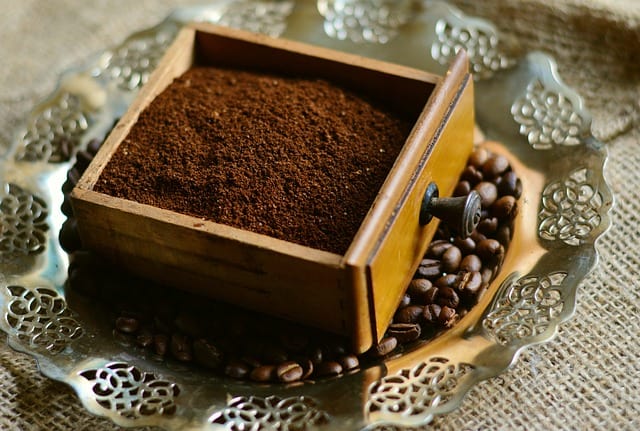I general terms, the only thing that should go down your drain is water and other liquids, within reason. Once you start pouring other things down the drain like coffee grounds, you’re starting to ask for trouble and not the good kind.
Coffee grounds are best disposed of in the compost or garbage bin. Some people put used coffee grounds on their lawn or on acid-loving plants like hydrangeas who like the nitrogen, potassium and other minerals and nutrients in coffee grounds.
Wet coffee grounds can clump up and if your drain already has food, soap scum, grease and other garbage collecting, it can make things worse and lead to pipes clogging. While coffee grounds may not clog your kitchen drain on their own, they can contribute to a clog over time.
There are several options for disposing of coffee grounds that are preferable to pouring them down the drain which we’ll discuss below in addition to quickly clearing backed up drains that you might experience.
How to prevent coffee grounds from going down the drain
The reality is that if you have a coffee maker that produces coffee grounds, you’re most likely rinsing something in your kitchen sink that is likely to send some grounds down the drain. Rinsing a coffee filter, used coffee grounds box or coffee pot are but three parts of a coffee maker that will have some coffee grounds that need to be washed off regularly.
So if you accept that some grounds will get washed down the drain which they will, the question is how to prevent most of them going down the drain.
Here are some things to do:

- Empty the coffee grounds somewhere else other than the drain i.e. in your compost, garbage, on your lawn or in a separate container to be used later. So most of the grounds aren’t going anywhere your sink which is a good start.
- If you have old coffee or extra coffee in the pot that you won’t drink, consider pouring it somewhere else other than in your sink i.e. on lawn or on plants.
- Add a small strainer in your kitchen sink like the one shown above. Even if it doesn’t stop coffee grounds going down the drain, it will prevent food and other debris which blocks your drain over time.
- Regularly clean your sink and inspect the drain closely for any evidence that it is draining slowly. If you have a pulldown kitchen faucet, you can quickly use high water pressure to rinse your drain every so often to force out a clog that might be developing. It’s easy to do and saves you resorting to chemical drain cleaners.
Options for disposing of old coffee grounds
Old coffee grounds can be disposed of in a few different ways:
- Composting: Coffee grounds are an excellent addition to a compost pile as they are rich in nitrogen and other nutrients. Mix them with other organic materials such as leaves and grass clippings to create a nutrient-rich soil amendment.
- Gardening: Spread used coffee grounds around certain plants as a natural fertilizer. Coffee grounds can also be used to make a natural pesticide spray by mixing them with water and spraying the solution on plants. Before you spread coffee grounds on your garden though, check to see which vegetation likes coffee grounds and which doesn’t.
- Cleaning: Used coffee grounds can be used as a gentle abrasive for cleaning dishes, pots and pans, and other surfaces.
- Landfills: If you don’t have a compost pile or plants in your garden, you can also throw the coffee grounds in the trash, which will end up in the landfill.
- Animal feed: Some farmers and pet owners use coffee grounds as animal feed, but it’s important to make sure the coffee grounds are fresh, and not moldy.
Which plants like coffee grounds and which ones don’t?
In general terms, coffee grounds are good for vegetation that responds well to acidity and aren’t good for vegetation that doesn’t like acidity.
Specifically:
Coffee grounds tend to be good when used sparingly for azaleas, hydrangeas, rhododendrons, lily of the valley, blueberries, carrots, and radishes among others. Coffee grounds can also be good on your lawn.
Coffee grounds are not good for plants that don’t like acidity such as tomatoes, lavender, orchids, geranium, asparagus fern, Chinese mustard and Italian ryegrass.
Check with a local plant pro if in doubt before putting coffee grounds on any living vegetation around your home or garden.
Summary
Coffee grounds can clog drains if they are poured down the drain in large quantities or if they are not properly disposed of. Coffee grounds can build up and form blockages in pipes, particularly in older or poorly maintained plumbing systems. The oils in coffee grounds can also solidify in cool temperatures and clog pipes.
It is best to dispose of coffee grounds in the trash, compost them or use them as fertilizer, cleaning abrasive and animal feed. If you do decide to wash coffee grounds down the drain, be sure to run hot water for a few seconds to help flush them down the pipe and prevent clogs.


